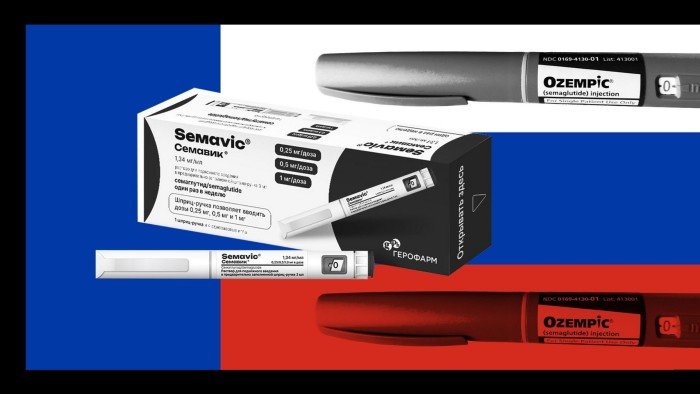Russians have taken to injecting themselves with cheap copycat Ozempic after Novo Nordisk’s withdrawal of its blockbuster drug prompted local pharma companies to flood the market with alternatives.
Five brands have taken over the lucrative niche after the drug, which is approved to treat diabetes but is also used unofficially for weight loss, became one of the few western medicines to all but disappear from Russian pharmacy shelves when western companies withdrew following Moscow’s full-scale invasion of Ukraine in 2022.
The Kremlin responded by signing off on a series of “compulsory licences”, letting local drugmakers use Novo Nordisk’s formula without a patent, with the claim that continued supply of the drug was crucial for hundreds of thousands of Russians with type 2 diabetes.
“Companies that want to achieve anything in this life try to make use of their opportunities,” said Marina Rykova, deputy chief executive of Geropharm, which dominates Russia’s retail market for the generic version of the drug.
It took nine months for Geropharm to start churning out what it says is an identical product from a factory near Moscow, using active ingredients from Chinese company Zhejiang Peptites Biotech. Together with its main competitors, Promomed and PSK Pharma, the companies soon found that their sales were surging.
Geropharm said its replica of Ozempic — called Semavic — sold more than a million packs in Russia in its first full year on the market. According to Russian analytics firm DSM Group, it was one of the three bestselling drugs in the country’s pharmacies in November and December, beating common cold medicines like Nurofen.
A month’s supply of Semavic sells for about $44 in Russia while leftover stock of genuine Ozempic costs about $55, because of government price caps on imported medicines to offset much lower salaries. In the US, it can cost more than $1,000 to buy the drug without insurance.

One Russian consultant living in Europe said he had taken to buying Ozempic in Russia, and bringing it into the EU for personal consumption, jokingly calling it “medical tourism from Russia”.
In an interview with the Financial Times, Rykova was open about the fact that their product “is this popular, of course, not because it treats type 2 diabetes, but because most studies have shown this drug is an effective treatment for obesity”.
In total, Russian consumers bought more than $96mn of copycat versions of Ozempic last year, with up to 80 per cent using the drug for weight loss, according to a report by analytics firm RNC Pharma.
Nikolay Bespalov, development director at RNC Pharma, said the trend had developed because: “In our country, there is still a fairly liberal attitude towards over-the-counter sale of prescription drugs.”
“For medicine that is not very strong or narcotic, in the vast majority of cases, almost everything is available without prescription.”
Russian internet forums have quickly filled with reviews, with people describing how they would increase their dosage after the amount recommended on the package did not yield the desired results.
Ozempic’s active ingredient, semaglutide, is marketed for both diabetes and weight loss, and is also used in Novo Nordisk’s obesity treatment Wegovy. Russian companies last year registered a range of generic versions.
In 2021, Novo Nordisk made up 100 per cent of the supply of semaglutide drugs to Russian hospitals and pharmacies in the government procurement market. By last year, Promomed and Geropharm accounted for 44 and 36 per cent respectively while Novo had 0.2 per cent, according to data from consultancy Headway Company.
Russia’s pharma industry had already benefited from compulsory licensing during the pandemic, with Prime Minister Mikhail Mishustin signing a decree allowing a local company to make copies of Remdesivir, the antiviral medication developed by Gilead Sciences.
The mechanism is normally used in developing countries during health emergencies to ensure the local population can access vital medicines at an affordable price.
Novo Nordisk told the Financial Times they “haven’t engaged in any negotiations about semaglutide products in Russia nor received any royalties”. Geropharm said they had contacted the company for permission but received no reply.
“It is not normal practice, where Mishustin can just write three to four paragraphs allowing this or other company to reproduce a patented product”, said Allan Gobbs, managing partner of US healthcare venture firm ATEM Capital.

“This means that if your drug is successful, they can just steal it,” he added. “Under such circumstances, large companies will lose interest in the Russian market, while local producers will stop putting effort into developing anything new.”
Most companies making Ozempic copies in Russia import their active ingredients from China or India, vouching for the safety of their products, which they say are fully bioequivalent and so should have the same risks and side effects.
But “in order for us to know whether a drug is really good or not, we need data transparency”, said Irina Yakutenko, a Russian molecular biologist based in Germany who runs a science channel on YouTube. “The data on these [copycat] drugs is not published in international peer-review journals, and not collated properly because so much is sold under the table.”
“If Chinese researchers copied the formula properly then perhaps everything is OK, but everyone knows what a lack of transparency can lead to,” she noted. “Things like this normally work until the first catastrophe.”
Additional reporting by Courtney Weaver and Hannah Kuchler. Data visualisation by Amy Borrett.

